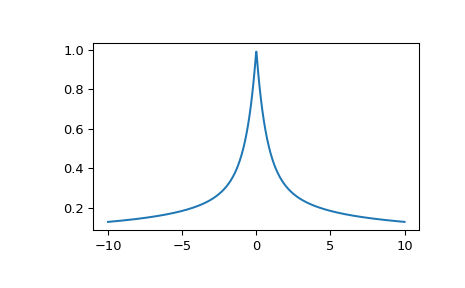scipy.special.i0e#
- scipy.special.i0e(x, out=None) = <ufunc 'i0e'>#
Exponentially scaled modified Bessel function of order 0.
Defined as:
i0e(x) = exp(-abs(x)) * i0(x).
- Parameters:
- xarray_like
Argument (float)
- outndarray, optional
Optional output array for the function values
- Returns:
- Iscalar or ndarray
Value of the exponentially scaled modified Bessel function of order 0 at x.
Notes
The range is partitioned into the two intervals [0, 8] and (8, infinity). Chebyshev polynomial expansions are employed in each interval. The polynomial expansions used are the same as those in
i0, but they are not multiplied by the dominant exponential factor.This function is a wrapper for the Cephes [1] routine
i0e.i0eis useful for large arguments x: for these,i0quickly overflows.References
[1]Cephes Mathematical Functions Library, http://www.netlib.org/cephes/
Examples
In the following example
i0returns infinity whereasi0estill returns a finite number.>>> from scipy.special import i0, i0e >>> i0(1000.), i0e(1000.) (inf, 0.012617240455891257)
Calculate the function at several points by providing a NumPy array or list for x:
>>> import numpy as np >>> i0e(np.array([-2., 0., 3.])) array([0.30850832, 1. , 0.24300035])
Plot the function from -10 to 10.
>>> import matplotlib.pyplot as plt >>> fig, ax = plt.subplots() >>> x = np.linspace(-10., 10., 1000) >>> y = i0e(x) >>> ax.plot(x, y) >>> plt.show()
